Netflix - Love, Death & Robots Season 4: A Glorious Mess of Puppet Strings, Cosmic Horrors, and Cat Conspiracies
By Mulder, 15 may 2025
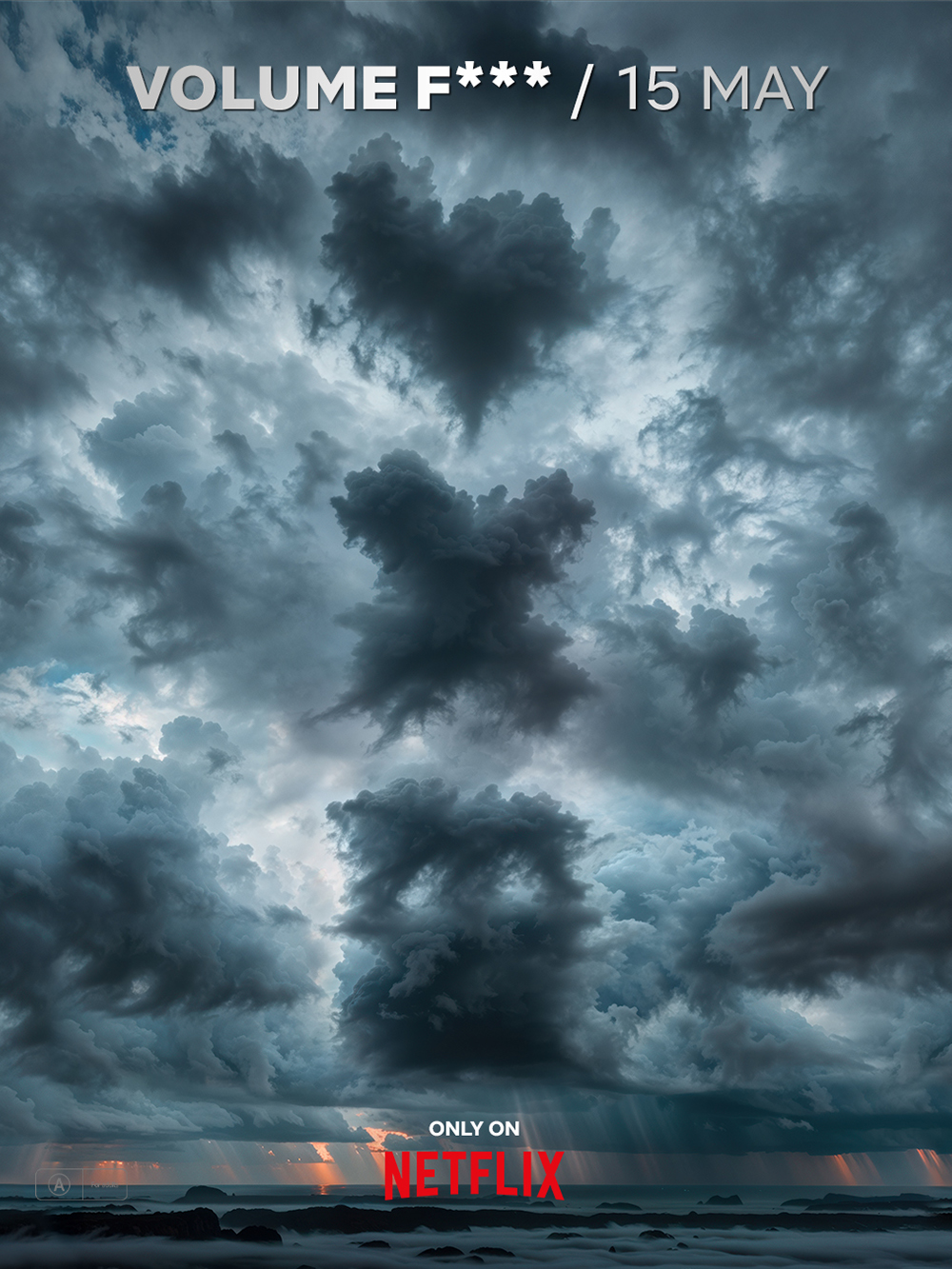
With its fourth volume, Love, Death & Robots storms back onto the Netflix platform with another batch of animated (and not-so-animated) chaos, and in doing so, it reasserts itself as one of the most experimental, bizarre, and artistically fearless projects in contemporary streaming. Helmed once again by the powerhouse duo of Tim Miller and David Fincher—along with a rotating cast of animators and directors ranging from Robert Valley to Jennifer Yuh Nelson—Volume 4 proves, if nothing else, that the boundaries of genre storytelling can still be bent, broken, and gleefully ignored. Across ten brand-new shorts, the series continues to flex its ability to jump between tones, styles, and worlds, balancing slapstick comedy and existential dread with the grace of a drunken poet stumbling into transcendence. It’s an anthology that relishes its status as a playground for adult animation, where the only rules are visual bravado and conceptual bravery—and even those are often subverted.
Kicking off the season in the most unexpected fashion is Can’t Stop, a puppet-pop fever dream directed by David Fincher that reimagines the Red Hot Chili Peppers’ legendary Slane Castle concert through the lens of surreal Supermarionation. At first glance, the short feels like a playful homage to Fincher’s roots in music videos—he did, after all, help define the genre in the ‘80s and ‘90s—but beneath the meticulously animated strings and glossy lighting, there’s an unnerving sense of detachment. The Chili Peppers are re-cast as bizarre marionette versions of themselves, performing to a similarly strung-up audience. It’s as if the entire music industry—artist and fan alike—is being manipulated by unseen forces, both metaphorically and literally. There’s no plot here, no twist or moral, just a feeling of uncanny spectacle. And maybe that’s the point: art as product, artist as puppet, and music as an endless, looped performance in the algorithmic age. That it opens the season is both baffling and brilliant—a gauntlet thrown down with style, if not substance.
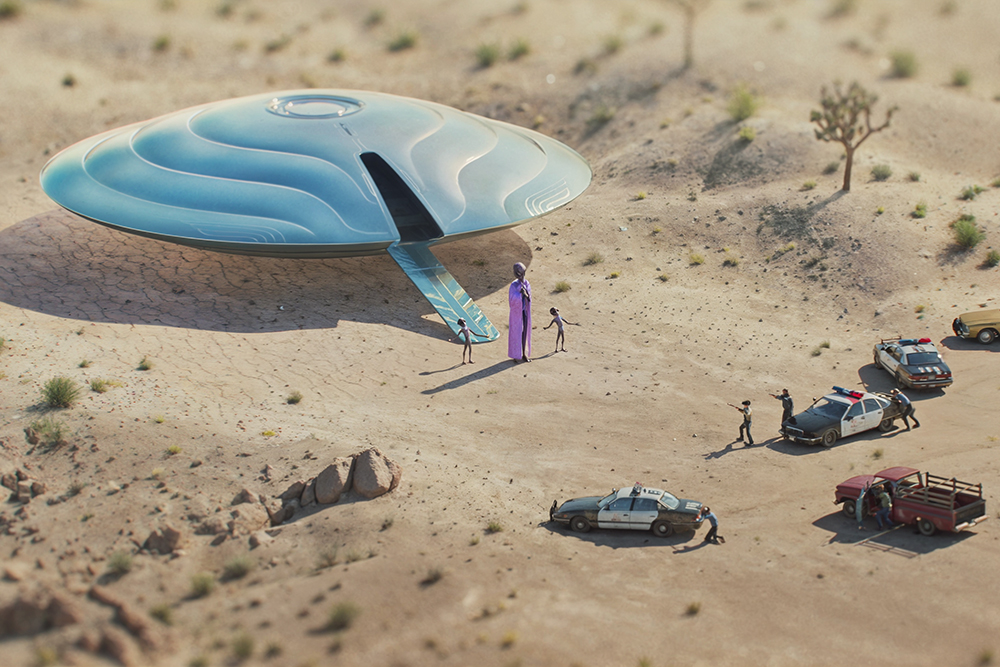
From there, the volume careens into more narratively rich territory with Spider Rose, a haunting and beautifully realized cyberpunk saga that returns to the biomechanical universe first explored in Volume 3’s Swarm. Directed by Jennifer Yuh Nelson, this is arguably the season’s emotional anchor, a short that threads grief, vengeance, and unexpected redemption into a compact but potent arc. At the center is a grieving woman, mechanized and hardened by loss, who finds herself tethered—initially through necessity, later through affection—to an alien creature with an odd, almost childlike intelligence. The animation here leans hard into hyperrealistic textures and lighting, grounding its fantastical elements in visual realism that enhances its emotional weight. What elevates Spider Rose above so many others is not just its world-building, which hints at layers of interstellar politics and history, but its character arc, which unfolds with subtlety and restraint. You can feel every pulse of pain, every shift in the protagonist’s moral compass, and the final note of catharsis lands like a soft punch to the chest.
In contrast, Smart Appliances, Stupid Owners, directed by Patrick Osborne, revels in absurdity with a comedic vignette that anthropomorphizes a host of smart devices—everything from a smug electric toothbrush to an overworked smart toilet—all of which are given voice (and attitude) in a claymation-inspired visual style. This is Love, Death & Robots at its most mischievous, a delightful diversion that riffs on our increasingly symbiotic and absurd relationship with technology. The voice cast here is star-studded and razor-sharp, featuring the likes of Kevin Hart, Amy Sedaris, and Ronny Chieng, each delivering punchlines with impeccable timing. But what’s impressive is how the episode uses its short runtime to pack in pointed commentary about user entitlement, AI burnout, and our emotional dependency on objects designed to serve us. It’s like Black Mirror filtered through the lens of Wallace & Gromit—darkly humorous, weirdly touching, and endlessly rewatchable.
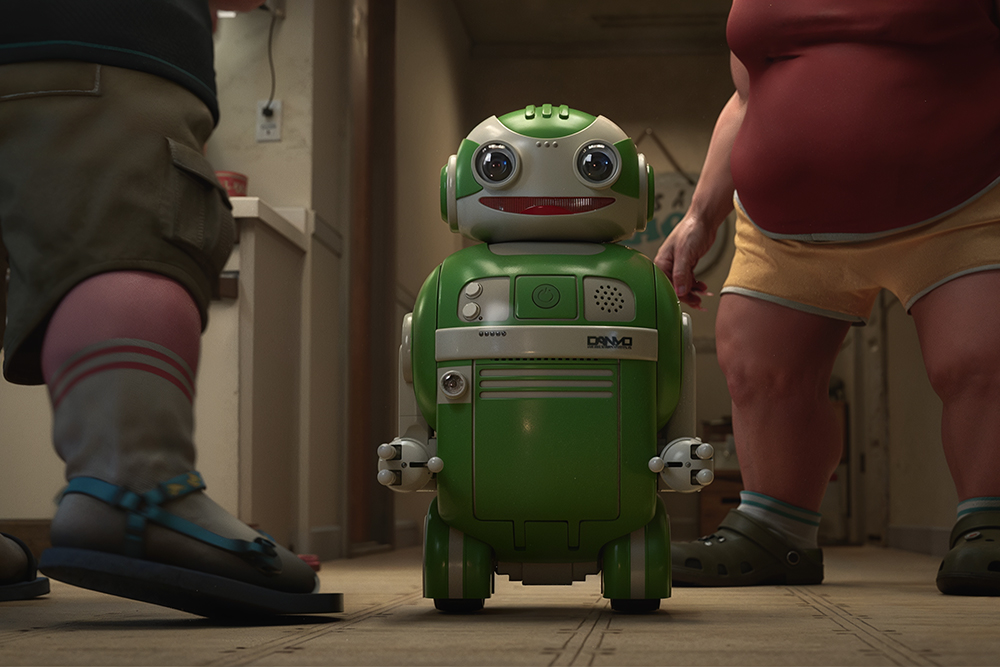
The theme of human arrogance gets a much darker treatment in How Zeke Got Religion, an occult World War II horror story animated in a gritty 2D style that evokes the feel of a vintage comic book come to demonic life. Directed by Diego Porral, the episode follows a bomber crew on a desperate mission to destroy a Nazi-occupied church before an ancient evil is summoned. This is perhaps the most viscerally terrifying short of the season, with a cosmic horror entity that is equal parts Lovecraftian nightmare and biblical monstrosity. What makes the episode so compelling is its unapologetic embrace of pulp tropes—Nazis, forbidden rituals, sacrificial doom—elevated by striking animation and a palpable sense of dread. Yet, it’s not just horror for horror’s sake. There’s a spiritual arc embedded in Zeke’s journey that, while understated, resonates with themes of sacrifice, belief, and transformation. In many ways, this is the closest the show has come to delivering a standalone horror classic, complete with a twist that lingers well beyond the closing credits.
Then comes The Screaming of the Tyrannosaur, which feels like Tim Miller’s most indulgent and gleeful exercise in world-building to date. A gladiatorial bloodsport staged aboard a space station orbiting Jupiter, where genetically modified warriors duel atop dinosaurs while the interstellar elite watch from opulent skyboxes? Sign us up. MrBeast, YouTube megastar and internet stunt philanthropist, makes an unexpected but oddly effective cameo as the arena’s flamboyant announcer, lending the episode a meta-textual layer that blurs the line between entertainment and exploitation. The episode is a marvel of cinematic CGI, with combat choreography that rivals anything seen in live-action blockbusters. But it’s not just spectacle—the short finds time for emotional beats and unexpected alliances, sneaking in a poignant message about class disparity, forced labor, and resilience. It’s the kind of episode that could (and maybe should) be spun out into its own full-length feature.
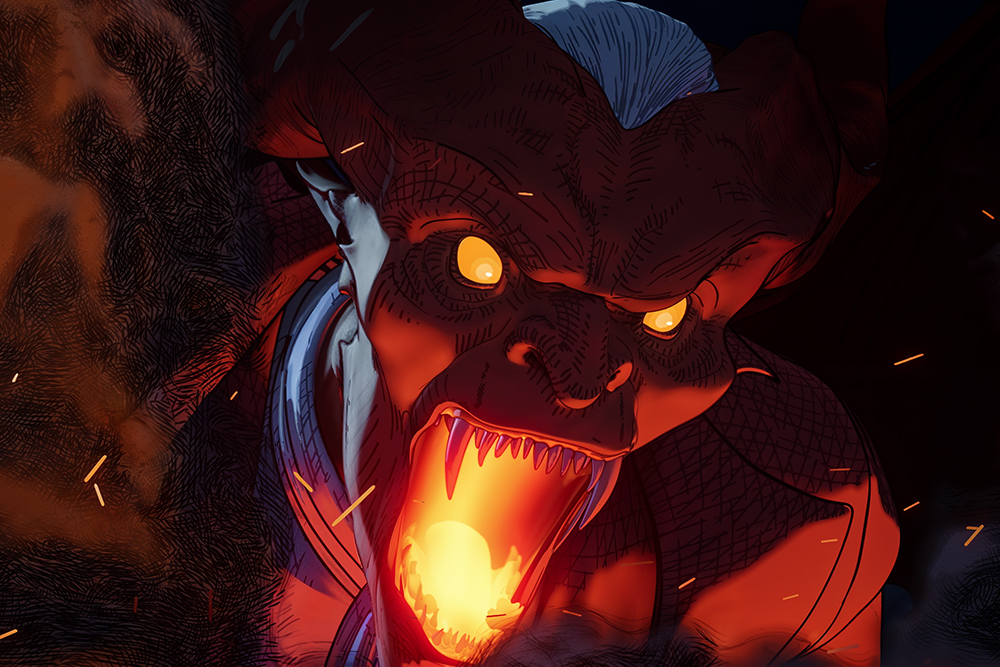
Not all entries hit quite as hard, of course. Golgotha, a live-action oddity starring Rhys Darby, tries to balance satire and sincerity as a hapless priest negotiates with religious alien squid-beings who believe Earth’s messiah has returned in the form of a dolphin. The premise is loaded with potential, but the execution feels like a sketch stretched just a bit too thin. Still, Darby’s performance is endearing, and the episode’s commentary on how we project our ideologies onto the unknown is at least worth a chuckle and a thought. 400 Boys, with its post-apocalyptic gang war against grotesque baby-giants, fares better thanks to Robert Valley’s signature animation style—angular, stylish, and kinetic—but its narrative ambitions slightly exceed its runtime, leaving the viewer entertained but slightly unsatisfied. There’s clearly a rich mythology behind this world, but we only glimpse the surface before the end credits roll.
Comedy returns in full force with The Other Large Thing, another cat-centric entry that sees a smug feline enlist the help of a newly installed smart assistant to overthrow its oblivious human owners. It’s a cute concept brought to life with crisp animation and sharp vocal performances (John Oliver’s turn as the robotic assistant is particularly delightful), but it doesn’t quite reach the heights of the show’s best comedic entries. Still, it’s undeniably charming and sure to please cat lovers and technophobes alike.
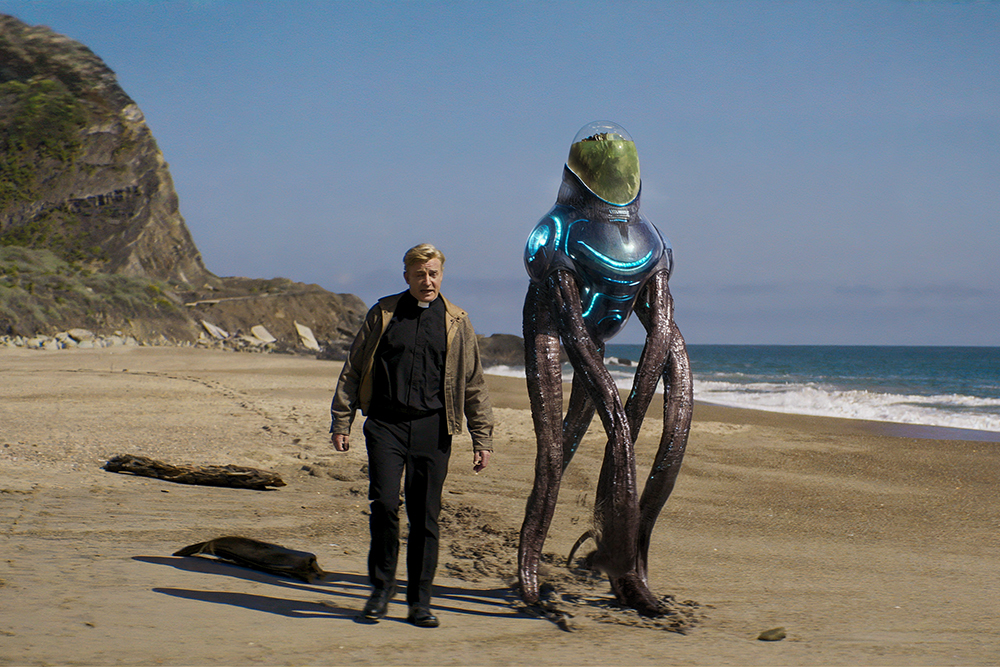
The season’s final offering, For He Can Creep, serves as both epilogue and crescendo. Set in 18th-century London, it tells the surreal tale of a poet whose writings attract the attention of Satan, and the feline protector who rises to stop him. The visual style, reminiscent of illuminated manuscripts and woodcut prints, is breathtaking, and Dan Stevens voices the Prince of Darkness with theatrical menace. What starts as literary pastiche ends as an operatic battle between good and evil, played out in fur, fire, and shadow. It’s absurd, beautiful, and unexpectedly moving—a fitting close to a season defined by its refusal to conform to expectations.
In the end, Love, Death & Robots Volume 4 is both a celebration and a cautionary tale. It celebrates the possibilities of the short-form anthology, reaffirming the idea that great stories can be told in under 20 minutes when vision and execution align. It’s also a reminder that ambition sometimes outpaces structure, and that even the wildest ideas can feel slight when they’re not given enough room to breathe. Still, what this volume lacks in cohesion, it more than makes up for in audacity. Few shows dare to be this weird, this varied, or this unapologetically grown-up. Whether it’s anthropomorphic gadgets, demonic rituals, or interstellar gladiators on dinosaur-back, Love, Death & Robots continues to swing for the fences—and more often than not, it connects.
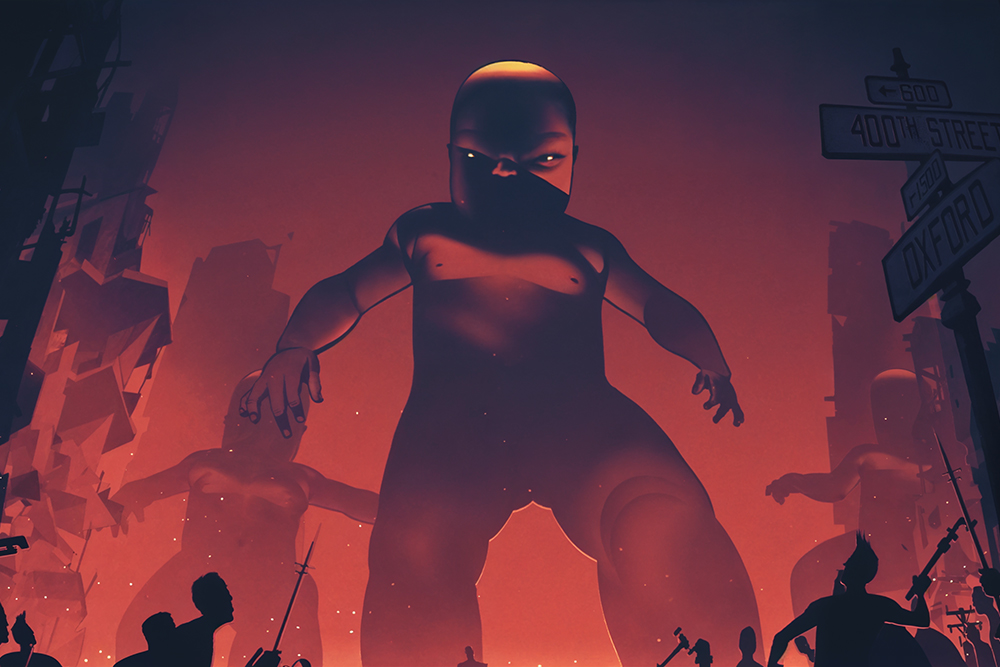
In a television landscape increasingly dominated by franchise spinoffs and safe bets, Love, Death & Robots remains a neon-soaked beacon of creative freedom. Volume 4 might not be its most consistent collection, but it is, in many ways, its most daring. The show’s core DNA—its willingness to experiment, to provoke, to let artists run wild—is still intact. And as long as it keeps inviting us into new worlds with every episode, it will continue to earn its place as one of the most vital and unpredictable series in the streaming era. Here's hoping Volume 5 brings even weirder wonders.
Synopsis :
Dinosaur gladiators, messianic cats, string-puppet rock stars, it can only be Love, Death & Robots. The fourth volume, presented by Tim Miller (Deadpool, Terminator: Dark Fate) and David Fincher (Mindhunter, The Killer), sees Jennifer Yuh Nelson (Kung Fu Panda 2, Kill Team Kill) return as supervising director for ten startling shorts showcasing the series’ signature, award-winning style of bleeding-edge animation, horror, sci-fi and humor. Buckle up.
Love, Death & Robots Season 4
Created by Tim Miller
Directed by David Fincher, Robert Bisi & Andy Lyon, Jennifer Yuh Nelson, Robert Valley, Tim Miller, Diego Porral, Patrick Osborne, Emily Dean
Executive producers : David Fincher, Tim Miller, Jennifer Miller, Joshua Donen
Cast : Red Hot Chili Peppers, Anthony Kiedis, Flea, John Frusciante, Chad Smith, Emily O'Brien, Feodor Chin, Piotr Michael, Sumalee Montano, John Boyega, Ed Skrein, Sienna King, Dwane Walcott, Rahul Kohli, Pamela Nomvete, Amar Chadha-Patel, Chris Parnell, John Oliver, Fred Tatasciore, Rachel Kimsey,, Rhys Darby, Moe Daniels, Graham McTavish, Phil Morris, Michelle Lukes, Matthew Waterson, MrBeast, Bai Ling, Keston John, Braden Lynch, Roger, Craig Smith, Gary Furlong, Bruce Thomas, Andrew Morgado, Scott Whyte, Melissa Villaseñor, Ronny Chieng, Amy Sedaris, Kevin Hart, Josh Brener, Nat Faxon, Niecy Nash-Betts, Brett Goldstein, Dan Stevens, JB Blanc, Jim Broadbent, Nika Futterman, Jane Leeves, Dave B. Mitchell
Running time : 6–21 minutes
Production companies : Blur Studio, Netflix Studios
Network : Netflix
Release March 15, 2019 – present
Photos : Copyright Netflix

